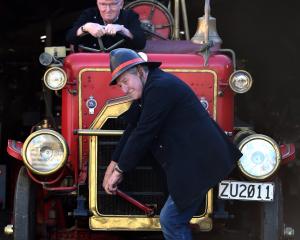

ABs’ largest score on tour
Vancouver, February 14: The New Zealand All Blacks defeated a picked Vancouver team by 49 points to nil. Nine thousand people saw the match — the largest crowd that has ever attended a sporting event in Vancouver. The visitors showed the local men how the Rugby game should be played, running up the highest score of the tour. Sporting experts are loud in their praises of the New Zealanders’ work. A feature of the game was a try scored by Nepia. He sneaked up quietly into the threequarter play, and before the Vancouverites knew what was happening he had the ball over the line. Richardson, of course, was absent, having broken his leg, and the injury to Porter’s eyebrow is still painful enough to keep him off the field.
Otago section of road worst
From Mr Ernie Hinds on the Main road from Christchurch to Southland: "After leaving Oamaru the road is only fair to Palmerston, but from the time one leaves here until Balclutha is reached the road is indescribable. A succession of pot holes, some of them quite big enough to create a public danger, and I feel that a motorist breaking a spring or some such thing would have just claim against the county council. There is no attempt to repair the roads, and to my knowledge this has been going on for years, and the roads getting gradually worse. From Balclutha to Gore the road is fairly good in places; with I think the exception of the first corner leaving, the road is very well marked with the "road route sign"; as you passed one the other came into view, and a motorist has no need to slacken speed or wonder which way to take. This is a great boon, and it is a pity that it is not carried out a little more thoroughly right through."
Milford earmarked for hydro
The Minister of Public Works (Hon J.G. Coates) mentioned that an application had been received from a syndicate to use water from the Bowen River for the purpose of generating electrical energy to be used chiefly for electro-chemical and electro-metallurgical purposes, such as extracting nitrates from the air.
The industry was the first of its kind in the dominion, and, if successful, would enable manures to be manufactured locally. — ODT, 16.2.1925
Compiled by Peter Dowden












